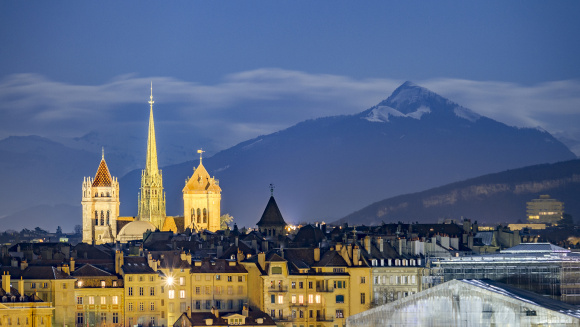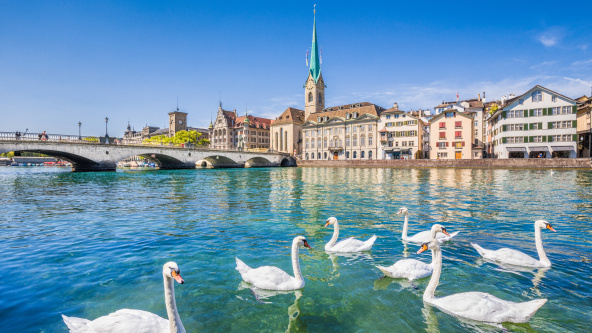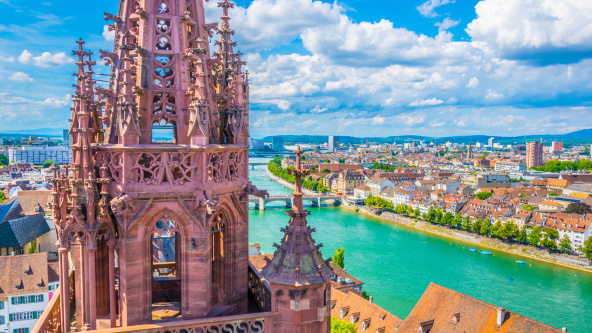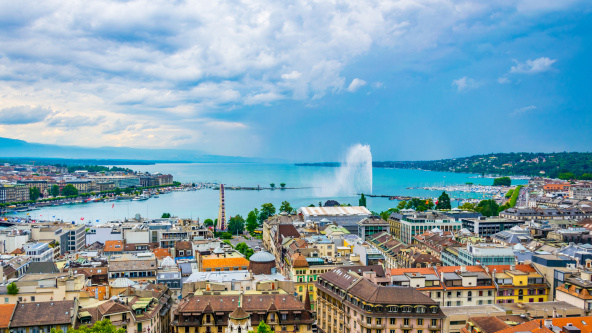Living in Geneva: an expat guide

What to expect when moving to Geneva
Geneva is in the French-speaking part of Switzerland and is encircled almost entirely by France, so it has, not surprisingly, a very French look and ambience. It is, however, one of the most international cities in Europe (and possibly the world) with around 40 per cent of the city’s population representing nearly 200 nationalities. Perhaps this is not surprising, as it is home to many international organisations and NGOs such as the UN, the World Health Organisation, and the Red Cross, a host of financial institutions, as well as the World headquarters for many multinationals.
Despite being such an international city, it is surprisingly small with a city population of around 200,000. Even the population of the whole canton is still below half a million. It is very much a city of culture where museums, exhibitions, art galleries, and theatres abound — although there are very few productions in English.
Outdoor living
The year-round outdoor lifestyle is a prized asset of living in the Geneva area. With the French and Swiss Alps as well as the Jura within striking distance, residents have the easiest access to the best of European skiing, climbing, mountain biking, and hill walking. Unlike many cities, Geneva has many parks most of which have great play areas for children of all ages.
The region offers a never-ending list of things to do including horse-riding, cycling, and tennis, while the lake offers many attractions and a diverse range of water sports with sailing being number one — don’t forget, the previous America’s Cup winners Alinghi come from here.
Is Geneva a safe place to live?
Above anything else, the biggest benefit Geneva offers to families is that it is a safe place to live. It consistently scores highly in surveys for quality of living and personal safety but this does come at a price; Geneva is one of the most expensive cities in the world to live in.
Where to live in Geneva
Your work permit may determine where you live: a G Frontalier means that you have to live in neighbouring France, while residents with B and C permits can choose. There are now many other types of permits offered by the Geneva Government so it would be wise to check with an expert, particularly which is better for you for tax reasons — remember Switzerland is not part of the EU.
Living outside Geneva
Although Geneva is fairly small and you can get ‘into town’ in 20 minutes from even the most far-flung villages in the canton (outside of rush hour), it is recommendable to live on the same side that you work or where your children go to school. Bear in mind that school finishes around midday on a Wednesday (this is true in most Geneva schools, both private and state). By the time you get home after drop-off, if you live on the other side of the city, it’s time to go back for pick-up.
What size of house can you expect to live in?
If you are coming from outside of continental Europe, be prepared to downsize. The average four-bedroom house is around 160 square metres (approx 1,800 sq ft) of habitable space (there may be plenty more room in the rafters). On the upside, most have basements with natural light which are great for playrooms/games rooms and studies and most have a laundry room too.
Getting started in Geneva
Once you’ve selected the house and school of choice, living and settling into Geneva is easy.
Above anything else, the biggest benefit Geneva offers to families is that it is a safe place to live. It consistently scores highly in surveys for quality of living and personal safety.
You can guarantee Swiss efficiency in the area of plumbing and heating — both are excellent. Workmen, however, are in huge demand and are renowned for being unreliable and don’t turn up when they say they will. Speaking with expat neighbours or parents at school will often find you a group of dependable, inexpensive but experienced workers from Eastern Europe.
Opening a bank account
Opening a bank account is straightforward. Just take your passport, some cash, a cheque, or wire transfer to the bank to open an account with a debit card. If you want a credit card, the bank will want to see bank statements and/or an attestation (letter of employment from your company). Don’t forget the official currency is Swiss Francs. Many merchants accept euros but they are not obliged to do so.
Getting a driving licence
If you plan to drive in Switzerland, you’ll need to transfer your driving licence within the year. If you have a licence from Middle Eastern or African countries you will have to take the Swiss driving test.
Health insurance
The Swiss health system is heralded around the world as being one of the best, but it must also be one of the most expensive for health insurance — if you are still negotiating a corporate relocation package, make sure you get health insurance, including dental and orthodontics for the whole family.
The system is very easy in that many doctors act as general practitioners; you don’t have to register with them, just call when you need an appointment. You get the same easy access to specialists, too, although some health insurance companies now have lists that are acceptable to them, so do check. Children have to be registered with a paediatrician; ask parents at school or neighbours for recommendations.
The Cantonal Hospital in Geneva is second to none, particularly for emergencies, and there is also an incredibly efficient doctor call-out service available throughout Geneva, but you do pay for the convenience.
All the latest advice from our education experts to help you make the right choices for your children, straight to your inbox.
Sign up nowDay-to-day living in Geneva
There is an amazing array of restaurants offering cuisines from around the world (although often adapted to European tastes), as well as traditional French and Swiss fare. The quality of food is superb. Don’t forget that Geneva is a major Swiss wine producer, so it is traditional to have a glass of local wine with your ‘plat du jour’ at lunchtime.
Grocery shopping
Check the opening hours of shops — other than shopping malls, department stores and large retail chains, many shops still shut at lunchtime during the week. All shops shut on Sundays except those at the airport and main train station which include a Migros (local supermarket chain). Be warned that your local Swiss supermarket will shut at around 6 pm on most weekdays and Saturdays, though some offer later closing at 7 pm on Thursday and Friday. Several major chains have online shopping facilities and home delivery.
Many people shop in France where the hypermarkets usually stay open until 9 pm, but again, all shops close on Sunday. Food is much cheaper over the border, but there are very strict customs allowances on certain food items, so be careful not to ‘smuggle’ as the fines are quite high.
There are also classic French fresh food markets selling local produce every day of the week. Some supermarkets sell a small range of American and English products and small grocery stores sell Asian, African, and Middle Eastern ingredients.
The last word
Although the Swiss are very welcoming, many foreign residents tend to stay within their own communities making friends through international playgroups, schools, and clubs. There are also organizations like the American International Women's Club which despite its name welcomes women of all nationalities.
Many expats get by without speaking much French, but taking some classes may just help you fall in love with Geneva a little bit more.
Featured in: Switzerland Geneva



